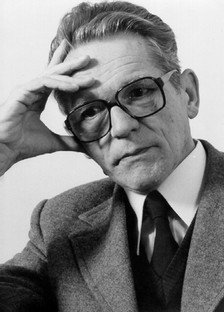
Mokranjac, Vasilije (1923–1984, Serbia), graduated in piano (under E. Hajek, 1948) and composition (S Rajičić, 1951). He worked at the Municipal School of Music “Josif Marinković“ (1948-52) and School of Music “Mokranjac” (1952-56). Professor of composition at the Academy of Music in Belgrade (1956–84). Full member of the Serbian Academy of Sciences and Arts.
His creative work initially relied on the classical foundations he acquired at school. From the very beginning he embraced them with specific romantic sensibility, oriented towards the relationships between the individual and collective principles, the Beethoven-like profile of symphonic thinking with strongly emphasized dramatic conflicts, which is particularly prominent in his graduation work Dramatic Overture (1950), as well as early piano (Two Piano Pieces Op. 1 and 2 from his pre-university days, Etudes, Sonata, Variations) and chamber pieces (Sonata for Violin and Piano). Similar characteristics are apparent in his first three symphonies (1961, 1965, 1967), Divertimento for Strings (1968) and Sinfonietta for Strings (1970), already mature works, manifesting an increasing affinity for more radical means (elements of 12-tone writing, polytonality). Turning towards modern sensibility is obvious as early as 1957 and 58, in his piano pieces Fragments and Dances, respectively. It reflects in bitonal sonorities, the neo-baroque construction of the cycles, the use of Scriabin’s mode, Bartokian driving rhythms, reflections of jazz. Neo-baroque formal concepts are also found in Concertino for Piano, String Orchestra and Two Harps (1958), but they also demonstrate his ability to assimilate elements of earlier styles and use them in a highly personal way; thus, elements of baroque, the exquisite impressionist sonorities of the slow movement and elemental folklore rhythms of the finale stand side by side without creating any friction. Subsequent stylistic evolution leads to Poema Lyrico (1974), Symphonies No. 4 (1974) and 5 (1978), Musica Concertante for Piano and Orchestra (1976). Yet, the philosophical sphere of his aspirations is sublimated in the purest form in piano composition Echoes (1973); it is generally regarded as one of the most distinctive piano work in the whole of Serbian music. His last achievements Poem for Piano (1983), piano cycle Preludes (1984) and Prelude for Clarinet Solo (1984) represent a kind of recapitulation of the path traversed, confirming once again that the creative act is an act in which one faces one’s tradition, environment, one’s own anxieties and dramas.
Poem, for piano and orchestra (1983)
Although written a decade after Echoes, Poem grows out of the same spiritual roots and content. The piano part is unusually treated: on the one hand, it is assigned the principal role – beginning and finishing the work all by itself, occuring at the key moments of the piece – but on the other, it integrates with the orchestral part when tutti takes the lead. In that way, the soloist recalls the role of the Evangelist from Bach’s Passions, in which Evangelist first speaks about events and sufferings, and than the choir and the orchestra take the major role. After the piano’s introduction, in which we become acquainted with the theme that will be gradually developing through the piece, dramatical and peaceful segments alternate. We encounter another kind of Mokranjac’s mastery – from two to three juxtaposednotes, which, seemingly, do not possess the character of a theme, he is developing a large gradation or a sudden explosion of sound. Brilliant orchestration adds to the powerfully dramatic experience of a modern man torn apart, who seeks the way out to light and tranquility. When, like in Echoes, the gigantic sonic blocks descend through orchestral and piano sound, and everything disappears into a dark abyss, the opening theme of piece, light and enlightenment will occur in the high, silvery piano register. After the theme is taken over by the orchestra and fanfare sounds as the solemn hymn, the piano will remain alone on the scene in order to say the last word. Eventually, the sound will ascend to the top of the keyboard, finish in the purest key of C-major, and disappear into silence of infinity. According to the composer’s words and opinion, this is a moment of reaching the Divinity.
Poem is the last major Mokranjac’s work. It was performed at BEMUS in 1983. In May next year Mokranjac tragically passed away.
Dušan Trbojević


